What is a Blue Zone?
In recent years, you may have heard the term “Blue Zone” brought up in conversations around health and longevity. For those of you wondering what the heck a Blue Zone is, and why Ikaria, Greece is a Blue Zone, this post will explore the Blue Zones research in more depth. Additionally, I will go into more detail about the wine that they drink in these healthy Blue Zone regions, and more specifically, about the wine from Ikaria, Greece, and the qualities of this Blue Zone wine.
The Blue Zones study is a research project that was developed in 2004 by Dan Buettner of National Geographic, and his team of demographers. Together, they identified five places in the world that are considered to be hotspots of longevity: Ikaria, Greece; Loma Linda, California; Nicoya, Costa Rica; Okinawa, Japan; and Sardinia, Italy. Each of these regions is known not only for the longevity of its people, with many residents reaching 100 years of age or more, but also for their vitality and high quality of life. When identifying these regions on a map, Buettner’s team circled them with a blue marker, thus naming them the “Blue Zones.”
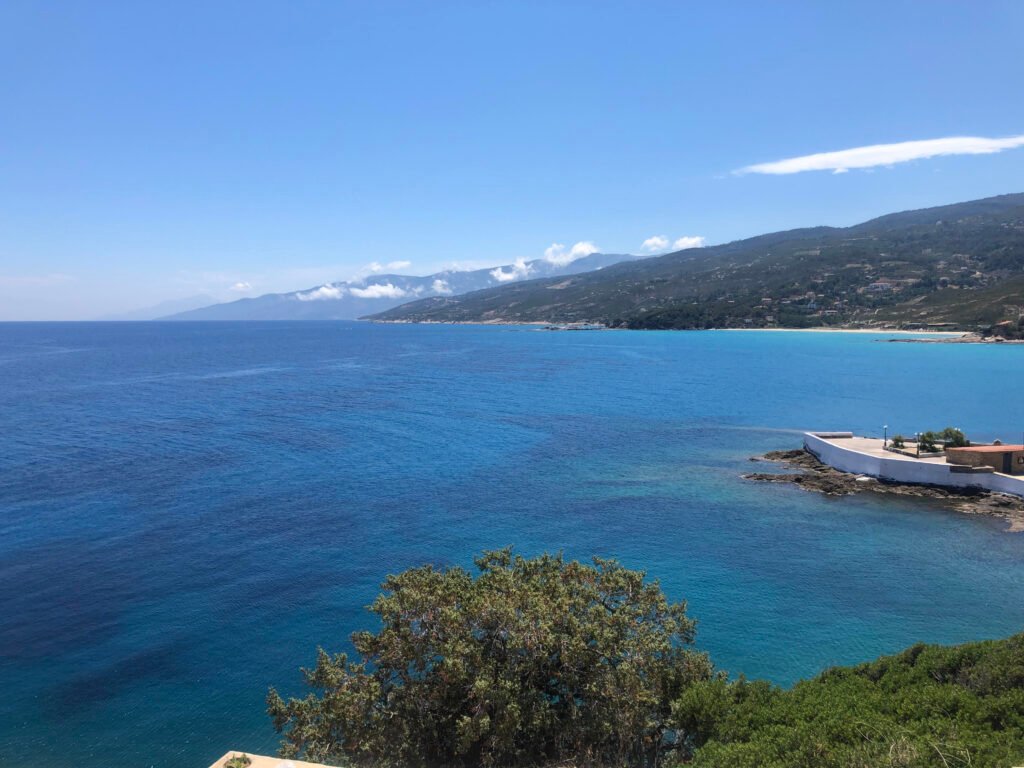
Buettner and his team established methodologies to determine why people in these areas live so much longer, with the intent of establishing the principles that determine a high quality of life. Though these regions are seemingly very different, the Blue Zones team identified 9 specific lifestyle habits that each Blue Zone shared, dubbing them the Power 9®.
The Power 9® Habits
- Move Naturally: Constant movement is important in Blue Zones. Although working out in gyms is less common, activities like gardening, walking, or cooking encourage people to move their bodies constantly throughout the day.
- Purpose: Knowing who you are, and why you want to wake up in the morning, has been proven to give up to seven years more of life expectancy. Purpose gives us both meaning and direction for our lives, and having a vocabulary to name your purpose is helpful in understanding what motivates you.
- Downshift: Although inhabitants of Blue Zones also experience the daily stress of life, they have healthy routines to combat it. Whether it is by prayer, napping, or happy hour, these activities done every day can reduce the chronic inflammation that is caused by extended stress.
- 80% Rule: Stop eating when you are 80% full. This idea is based on a Confucian mantra that Okinawan residents say before a meal, but the concept extends itself to the other Blue Zones. Often, the biggest meal of the day is at breakfast, and the smallest meal is in the evening before bed. Prayer before meals, eating with family, and eating slowly, are all Blue Zone ways to decrease food consumption.
- Plant Slant: A plant-based diet is the theme within the Blue Zones, with a heavy emphasis on beans. Beans are economic, nutritious, and filled with protein and fiber. Meat consumption is scarce, and carbohydrates consumed are typically whole-grains or sourdough bread.
- Wine at 5: Besides the Adventist community in Linda Loma, people in Blue Zones drink alcohol regularly. Studies have shown that moderate alcohol drinkers (1-2 glasses per day) outlive non-drinkers. Considering that both Sardinia and Ikaria are well-known wine producing regions, there is a new (and delicious) excuse to drink wine from healthy Blue Zone regions.
- Belong: Faith can be powerful. Attending a faith-based service once a week can add anywhere from 4-14 more years of life expectancy.
- Loved Ones First: Family ties are actively cultivated in Blue Zone households. Aging parents often live nearby or within the household, and people tend to commit to life partnerships, which can add up to 3 more years of life expectancy. These multi-generational relationships are beneficial to the children, parents, and grandparents, and give Blue Zone residents the satisfaction of emotional security and love.
- Right Tribe: Finding the right social group to support one’s lifestyle is of the utmost importance. Social behaviors are contagious, so finding friends that engage in positive behavior is vital for one’s mental and physical well-being.
Why is Ikaria, Greece a Blue Zone?
Ikaria is an island that has long been revered for the longevity of its people. The modern-day Blue Zones research confirms this, but there have been accounts detailing the vitality of the native Ikarian islanders for hundreds of years. In the 17th century, for example, Joseph Giorgirenis, the arch-bishop of Samos Island, traveled to various islands of the Aegean and described his account of their lifestyle in his book, Description of the Present State of Samos, Nicaria, Patmos, and Mount Athos.
While in Ikaria (then known as Nicaria), he wrote,
“The most commendable thing of this island is their air and water, both so healthful, that the people are very long lived, it being an ordinary thing to see persons of 100 years of age, which is a great wonder, considering how hardily they live” (p. 61).
Ikaria’s unique terrain may have also helped it in establishing the longevity of its people. Ikaria is a small island located in the Northeast Aegean Sea. Due to its location, it has been invaded throughout history by the Persians, Romans, and Turks, which led the native islanders to move away from the coast, and higher into the mountain regions where they could live safely. This isolation allowed the Ikarians to live closely in community, solidify their traditions, and establish deep family ties, which all help to extend life expectancy.
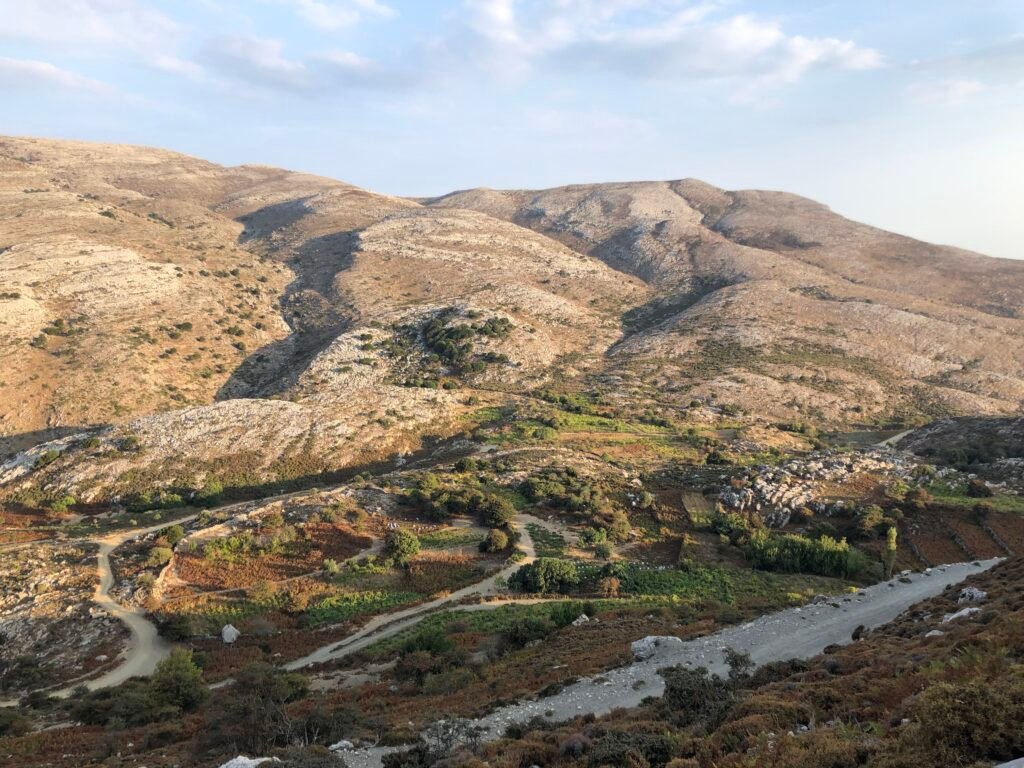
According to Buttener’s research, there are a few specific lifestyle habits that make up the unique qualities of Ikaria, Greece as a Blue Zone. The following customs are specific to Ikaria’s culture of longevity:
Ikaria, Greece Blue Zone Habits
Mountain Living: Ikaria’s mountainous terrain forces its inhabitants to exercise even while completing normal tasks: walking to the neighbor’s house, gardening, or working on their own yard. This mindless movement helps to keep the island’s residents in shape.
Mediterranean style diet: Vegetables make up the majority of the Ikarian diet. Whole grains, beans, potatoes, and olive oil are also important facets, with meat and fish composing only a small percentage.
Herbal Teas: Herbs are abundant on the island, and often people will start their day with tea instead of coffee, or family members will gather in the afternoon to enjoy tea together. These natural herbs act as a diuretic, which help to keep blood pressure in check by washing out the system of excess sodium and water.
Naps: A mid-afternoon nap is part of Ikarian culture. It is also a great way to relieve one’s body of stress. People who nap regularly can have up to a 35% lower chance of dying from heart disease.
Occasional Fasting: Because of their Greek Orthodox religion, Ikarians that follow the religious calendar may fast almost half the year. This caloric restriction is a way to slow the aging process and increase longevity.
Prioritize Friends & Family: Ikarians create strong social connections, and foster them continually. From family meals, to sharing some wine, to the epic panagiria parties that the island is known for, strong social connections foster a sense of belonging, which benefits overall health and longevity.
Goat’s Milk over Cow’s Milk: Goats are one of the main livestock on the island. Goat’s milk contains potassium and the stress-relieving hormone tryptophan. Additionally, goat’s milk is hypoallergenic and can be tolerated by most people.
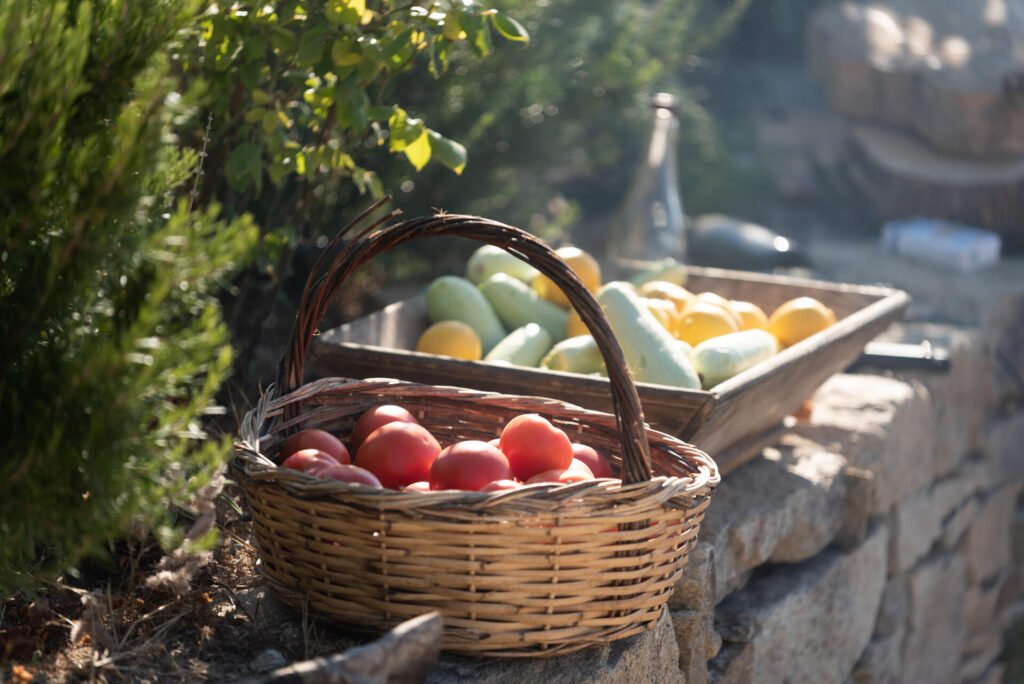
Blue Zone Ikarian Wine
Now, back to writing about my favorite thing… Ikarian wine! In antiquity, wine from Ikaria was known as “Pramnian wine,” that is, wine originating from Mount Pramnos, a distinct mountain range on the island. Pramnian wine also shows up in the Homeric works of The Iliad and The Odyssey, but I will expound a bit more on the literary connections to wine from Ikaria in an upcoming blog post…stay tuned.
Throughout history, Ikarian wine has been esteemed for its medicinal values and strong characteristics. The ancient historian, Eparchides, proclaimed Pramnian wine as, “A wine that has neither sweetness nor body, austere, dry, and with a singular power.” It was described as unsuitable for the ancient Greek symposiums, in which aristocratic men drank wine and discussed philosophy, as the Pramnian wine was too intense and would intoxicate the guests too quickly.
Acclaimed historical doctors, Hippocrates and Galen, also prescribed Pramnian wine for its medicinal qualities. Some of its apparent uses were for healing an infected wound, or for curing fits of depression or mental disorder. Personally, I find this very relatable, as I also feel cured from a fit of depression with a bit of wine…hehe 🙂
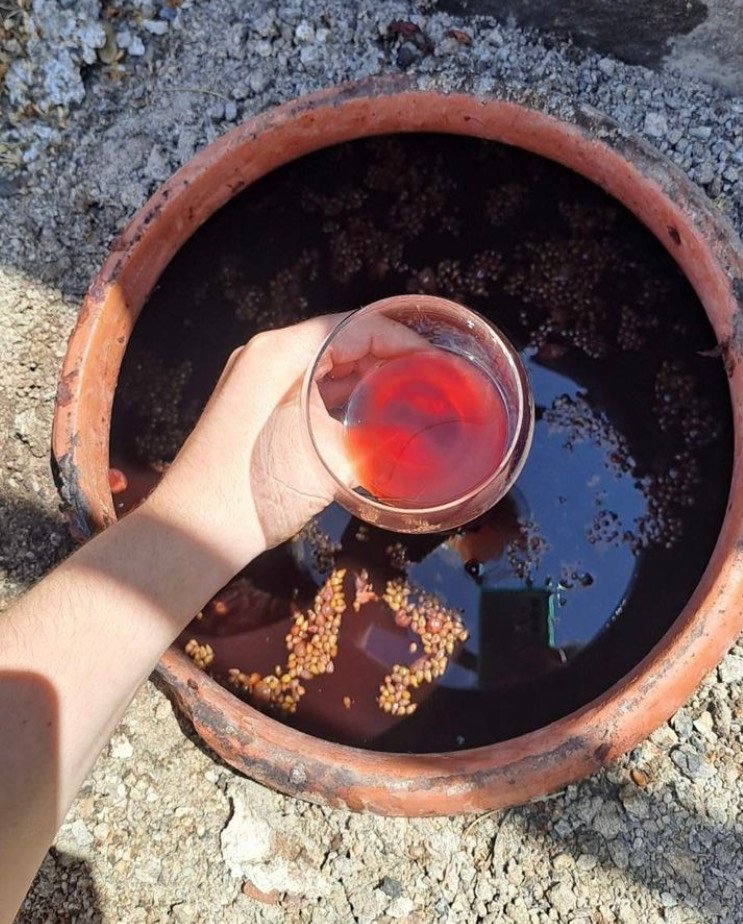
The ancient Greek historian, Semos, also wrote about wine from Ikaria, quoting,
“In Ikaria there is a rock, the so-called ‘Pramnos’ and next to it there is a high mountain, and on this mountain they produce Pramnian wine, which is also called by some Pharmakites, meaning medicine.”
Wine from Ikaria was truly considered medicine in ancient times, and had a variety of uses, from physical to emotional remedies. It is incredible to witness the long lineage of Ikarian wine as medicine, with the modern Blue Zones research confirming the health benefits of Ikarian wine as well.
Natural Wine in Ikaria, Greece: Afianes Wines
Our incredible partners on the island, Afianes Wines, farm biodynamically and produce natural wines. Although there is not one “catch-all” definition for natural wines, it generally indicates a minimal intervention approach, which means that nothing is added or taken away during the winemaking process. That means that the fermentation is produced naturally, with the native yeast found in the vineyard ultimately fermenting the grapes, and that the wines are left unfiltered and unfined, allowing natural sediment to remain in the final product.
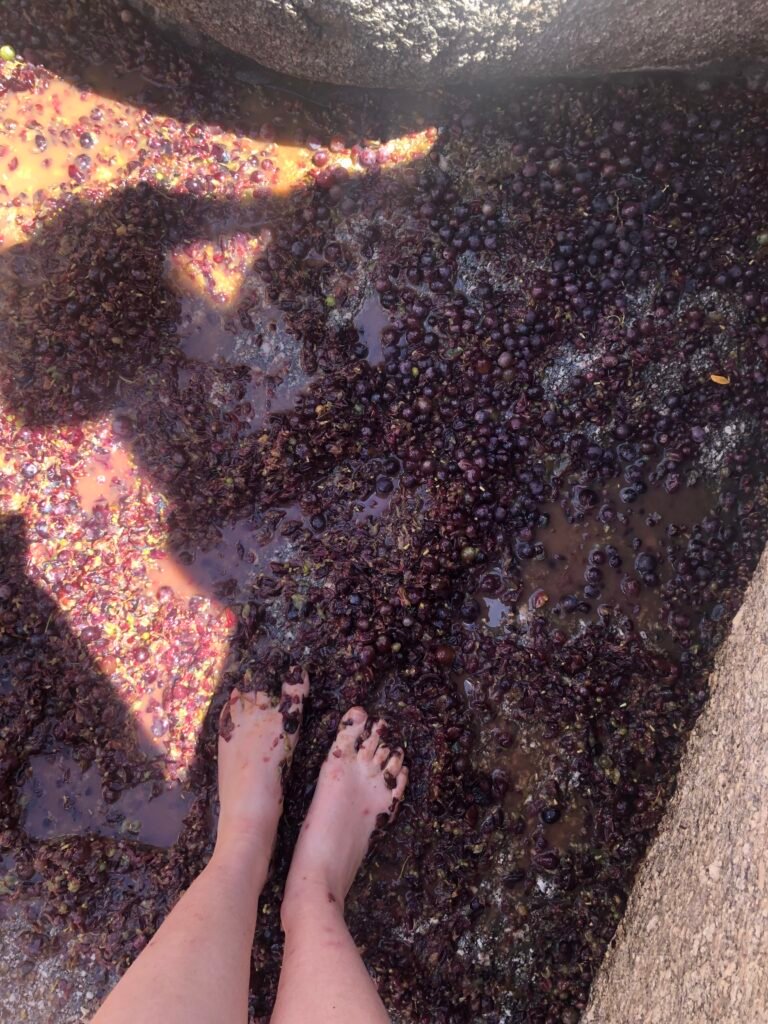
Biodynamic farming is a farming philosophy that focuses on biodiversity, and in creating a healthy and self-sustaining ecosystem. Organic and biodynamic farming share similar roots in that they both do not use synthetic fertilizers or pesticides, but biodynamic farming is even stricter in what they do and do not allow.
Biodynamic winemaking focuses more on prevention, than on reaction. Thus, the vineyards are treated throughout the year with nine herbal and mineral based preparations to encourage their health, instead of conventional pesticides or herbicides. The health of the soil is considered carefully, and organic matter through composting is recycled back into the soil to provide a diversity of minerals and nutrients. Throughout the year, the vineyard tasks such as planting, pruning, and picking are carried out on specific days that follow the lunar calendar. It is a system that reveres the land with the utmost respect, and does all it can to work in harmony alongside it.
Our Takeaway: Drink More Blue Zone Wine from Ikaria, Greece
The Blue Zones research is fascinating, and something that we can all learn from: how to live long, and how to live well. In evaluating our own lifestyles, there are always small improvements that can be made, whether it is by incorporating more vegetable and beans into our diet, making an effort to spend more time with our loved ones, or sharing a glass of wine from Ikaria, Greece.
My biggest takeaway from the Blue Zones research is to deepen my sense of belonging to the world. Wine is a beautiful way to do that, because wine really is a representation of life. It is the captured expression of a place, and a person, that have worked together in harmony to create something wonderful. Wine makes our lives more joyful by connecting us closer to the earth and to each other. Some of the greatest moments and conversations of my life have been over a bottle of wine shared with my family and friends. The Latin quote of “in vino veritas,” expresses that there is truth in wine. But I prefer “in vino vitalis;” in wine there is life. And, according to the Blue Zones research, a long and happy one at that.
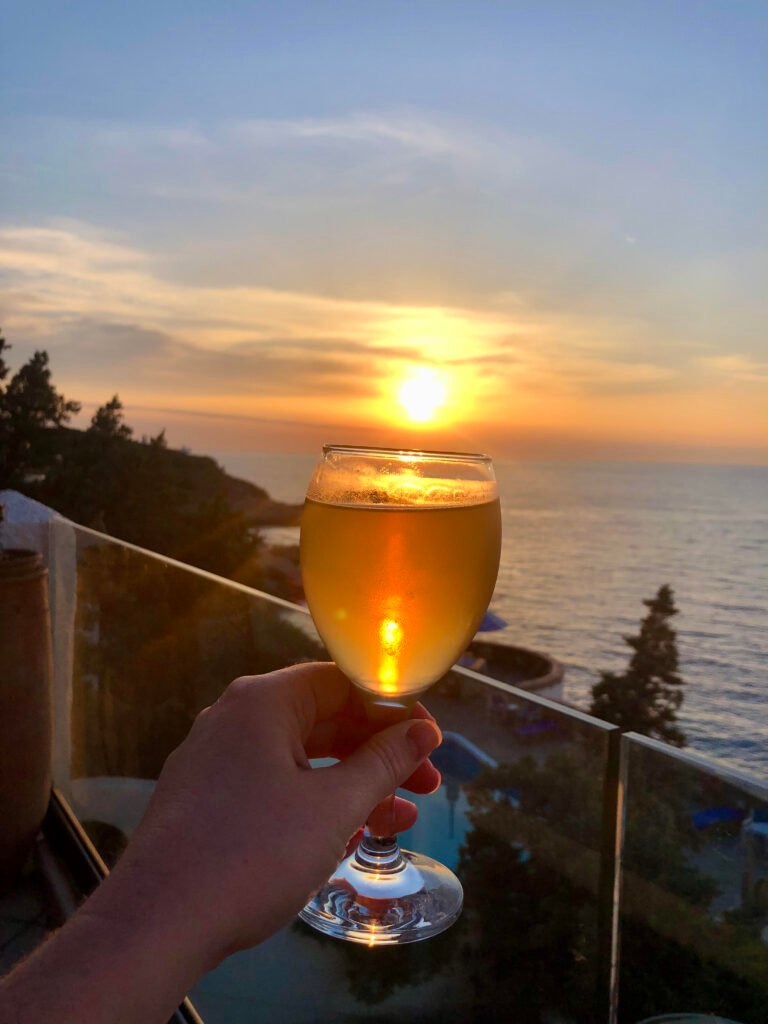



4 Responses